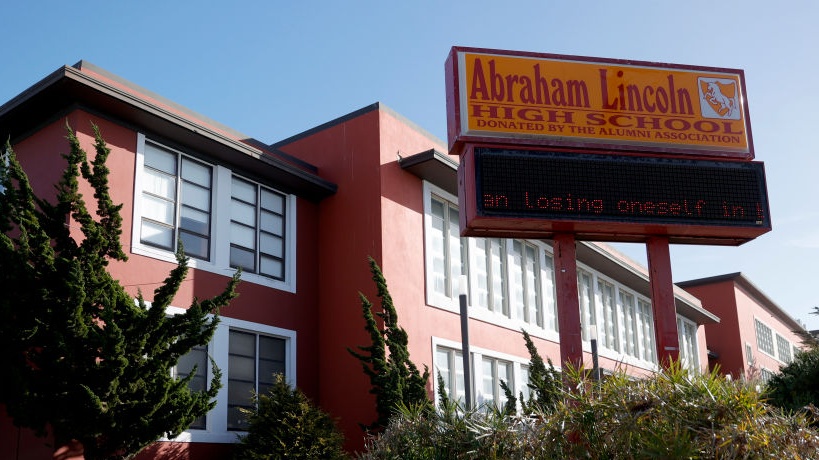In an unprecedented move, the San Francisco Board of Education has motioned to rename local public school buildings honoring controversial U.S. presidents and historical figures.
The board’s decision was approved on a 6-1 vote that will alter the names of one-third of the city's schools and arrives almost three years after the board initially pondered the proposal, according to CBS News. The resolution was approved on Tuesday and it calls for removing the names that honored historical figures with connections to slavery, racism or the "subjugation" of human beings.
The affected schools include those named after George Washington, Thomas Jefferson, Abraham Lincoln and others who have owned enslaved Black people or contributed to the American slave trade.
San Francisco Board of Education President Gabriela Lopez promised that the move won’t “cancel or erase" historical figures.
"But it does shift from upholding them and honoring them, and these opportunities are a great way to have that conversation about our past and have an opportunity to uplift new voices," she added.
Lopez said the decision is important at a time when it is necessary to send a strong message to condemn "racist symbols and white supremacy culture we see in our country."
Mayor London Breed, the first Black woman to hold the position in San Francisco, criticized the move for its poor timing due to the COVID-19 pandemic.
"Our students are suffering, and we should be talking about getting them in classrooms, getting them mental health support, and getting them the resources they need in this challenging time," Breed said, adding that she supports a more comprehensive discussion about renaming schools that should include parents, students and school stakeholders when classrooms reopen.
CBS News reported that the renaming process was overseen by a committee convened in 2018 to study the names of district schools following the events of the deadly white supremacist rally in Charlottesville, Virginia.
The committee was tasked with evaluating schools named after people who were owners of enslaved people or associated with the exploitation, colonization or oppression of women, children, or members of the LGTBQ+ community. They also investigated the names of schools that honored anyone who upheld racist or white supremacist beliefs, according to CBS News.
Lopez said the schools have until April to offer new names that the board will vote on. She expressed that the renaming process "could take a couple of years" to finalize.
Dianne Feinstein Elementary, named after the Democratic senator and former city mayor, is among the more controversial schools included in the motion. Her Democratic peers asked for her to retire after she thanked Republican Sen. Lindsey Graham for his work presiding over the confirmation hearings of U.S. Supreme Court associate justice Amy Coney Barrett in October, according to Yahoo News.
Following the hearings, progressive advocacy group Demand Justice called for Feinstein to step down as the Senate Judiciary Committee’s top Democrat.
“It’s time for Sen. Feinstein to step down from her leadership position on the Senate Judiciary Committee,” executive director Brian Fallon said. “She has undercut Dems’ position at every step of this process, from undermining calls for a filibuster and court reform … to thanking Republicans for the most egregious partisan power grab in the modern history of the Supreme Court.”
As conversations about racial reconciliation spread nationally, historian Harold Holzer warned against excessively altering how our country has traditionally honored its past.
"I think there's a danger in applying 21st-century moral standards to historical figures of one or two centuries ago," he told CBS News. "We expect everyone to be perfect. We expect everyone to be enlightened. But an enlightened person of 1865 is not the same as an enlightened person of 2021."
In particular, the historian is against the renaming of Abraham Lincoln High School, which the San Francisco board said was due to the treatment of Native Americans during Lincoln's term as president.
Lincoln is celebrated by many for abolishing American slavery through the signing of the Emancipation Proclamation, which eventually freed enslaved Black people in the southern states of the Confederacy.
"No one deserves more credit for the destruction of slavery," Holzer, a Lincoln Scholar and director of Hunter College's Roosevelt House of Public Policy Institute, said. "Lincoln is much more liberator than he is an abuser on the subject of racial justice."
However, Black historians and documentarians have expressed that they found Lincoln didn’t believe Black people to be equal to white people. According to Nikole Hannah-Jones’ Pulitzer Prize-winning "The 1619 Project," Lincoln told his critics that if he could preserve the Union by freeing all slaves, some slaves, or no slaves, he would do whichever best helped him win the war. Upon issuing the Emancipation Proclamation, Lincoln told a group of abolitionist pastors that he endorsed it as a "practical war measure" to quell the Confederacy, not because he was trying to end slavery.
Even though the Emancipation Proclamation allowed Black people to serve in the Union army, they were paid less and were often discriminated against by white officers.
Lincoln was also once against granting Black Americans the right to vote. But in a speech on April 11, 1865, he indicated that he was changing his perspective on the matter due to the “very intelligent” soldiers who fought in the war.
